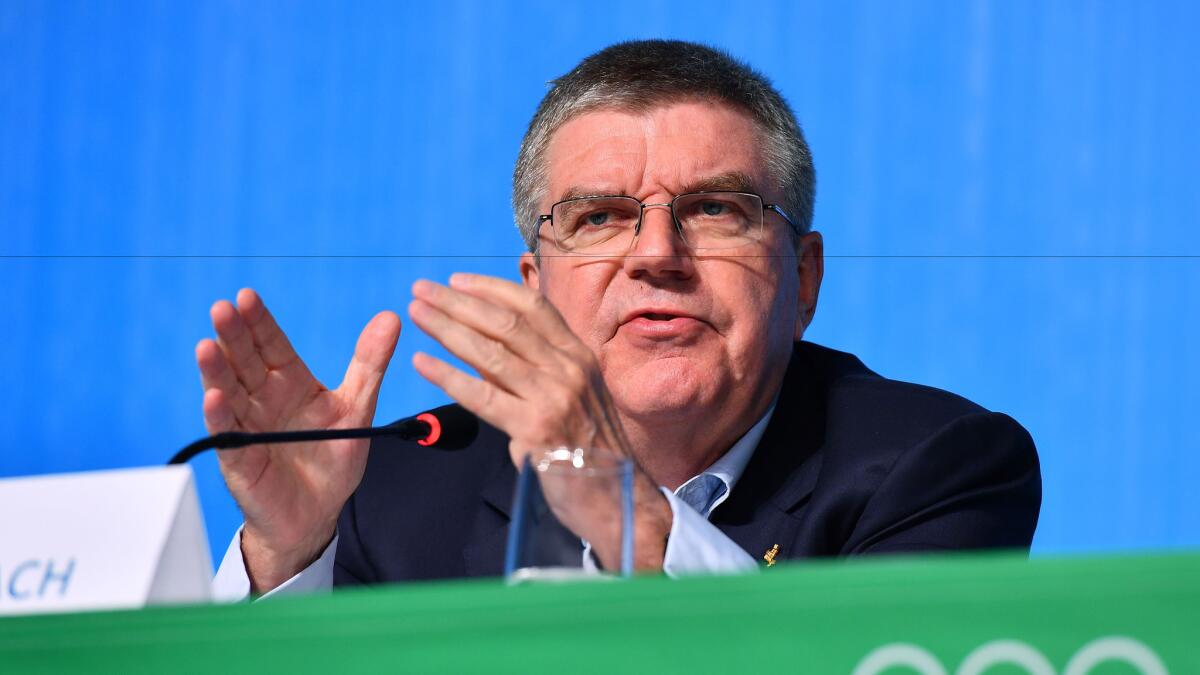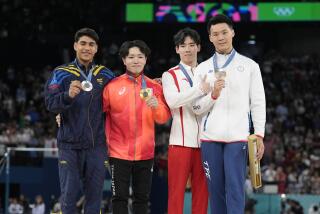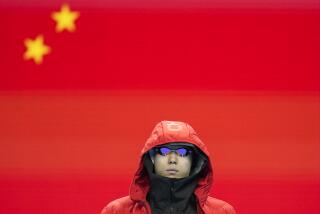On eve of the Games, Thomas Bach defends IOC over Russian doping crisis

Reporting from Rio de Janeiro — When the head of the International Olympic Committee faced reporters here Sunday – less than a week before the start of the 2016 Summer Games – certain words kept getting thrown at him.
Chaos. Embarrassment. Failure.
The questions were tough because these Games are embroiled in a doping crisis unprecedented in the history of the Olympic movement. And IOC President Thomas Bach seemed clearly on the defensive.
“The IOC cannot be made responsible, neither for the timing nor for the reasons of these incidents we face now,” he said at an afternoon news conference.
The turmoil centers on the Russian contingent and hurried deliberations over which of its athletes should be allowed to compete when the Games begin on Friday.
Amid allegations of widespread cheating in Russia, the IOC has drawn criticism from athletes, anti-doping officials and the media for its recent decision not to ban the country entirely.
Olympic officials instead asked the international federations that govern each sport to consider each Russian athlete’s eligibility on a case-by-case basis. An international arbitration court has been called into play as banned athletes file appeals.
This week in Rio, the IOC created a three-person panel to make the final call, adding one more step to a complex process that must reach some kind of resolution in the next five days.
So far, more than 100 of Russia’s athletes have been excluded by their federations with more than 250 cleared to compete.
Asked whether the current uncertainty might be damaging to the Olympic brand, Bach said: “No. This is for very obvious reasons.”
The president then deflected much of the blame toward anti-doping officials.
The Russian scandal began late last year when the World Anti-Doping Agency issued the first of three reports alleging that Russian athletes, coaches and officials have been involved in systemic cheating.
Those allegations include claims that workers at drug-testing labs in Moscow and Sochi swapped clean urine samples for dirty ones.
The most-recent investigation – called the McLaren Report – was not published until mid-July, at which point WADA suggested banning Russia.
Bach pointed out that WADA had been aware of possible wrongdoing in Russia for some time.
“The IOC is not responsible for the timing of the McLaren Report,” he said. “The IOC is not responsible for the fact that different information which was offered to WADA already a couple of years ago was not followed up.”
Olympic leaders have stated repeatedly they did not favor a blanket ban that might punish some Russian athletes who had never used performance-enhancing drugs.
As part of the IOC’s alternate approach, the Russians are not being afforded a presumption of innocence and — unlike athletes from other countries — cannot compete if they previously have been caught cheating, even if they have served their penalties.
Bach insisted that much of the international sports world supports this decision.
“Of course the negative opinions are most likely to be quoted,” he said.
The exact composition of the Russian team could change in coming days as the vetting process continues at break-neck pace.
“Imagine if we had not taken a decision, what limbo we would be in then,” Bach said. “I trust the people realize the difficulties we are in.”
More to Read
Go beyond the scoreboard
Get the latest on L.A.'s teams in the daily Sports Report newsletter.
You may occasionally receive promotional content from the Los Angeles Times.







